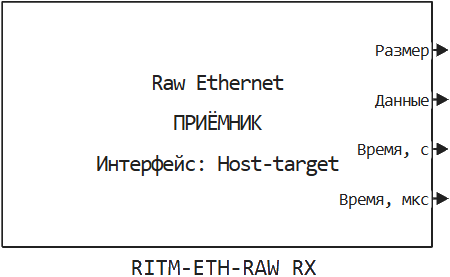RITM-ETH-RAW RX
Receiving raw data over Ethernet and returning the data of the last received packet.
blockType: CFunction
|
Path in the library: |
Description
| To work with the block, install/update the support package RITM blocks. |
Block RITM-ETH-RAW RX used to receive raw data over Ethernet. Returns the data of the last received packet.
Ports
Output
#
Size
—
number of bytes received
scalar
Details
Not more than the value of the Maximum message size parameters.
| Data types |
|
| Complex numbers support |
No |
#
Data
—
array of received bytes
vector
Details
| Data types |
|
| Complex numbers support |
No |
#
Time, s
—
time in seconds since the beginning of the UNIX era at which the packet was received
scalar
Details
| Data types |
|
| Complex numbers support |
No |
#
Time, µs
—
fractional part of time
scalar
Details
The number of microseconds elapsed since the beginning of a second.
| Data types |
|
| Complex numbers support |
No |
Parameters
Main group
#
Интерфейс Ethernet: —
the Ethernet port that will be used to receive messages
Host-target | Ethernet 1 | Ethernet 2 | Ethernet 3 | Ethernet 4 | Ethernet 5 | Ethernet 6 | Ethernet 7 | Ethernet 8 | Ethernet 9
Details
The port numbers are indicated on the case of the KPM "RITM".
| Values |
|
| Default value |
|
| Program usage name |
|
| Tunable |
No |
| Evaluatable |
Yes |
# Максимальный размер сообщения: — the maximum possible length of the received message
Details
| Default value |
|
| Program usage name |
|
| Tunable |
No |
| Evaluatable |
Yes |
# Неразборчивый режим — switching the port to promiscuous mode, in which the network card accepts all packets regardless of who they are addressed to.
Details
| Default value |
|
| Program usage name |
|
| Tunable |
No |
| Evaluatable |
Yes |
# Использовать фильтр — flag that allows you to enable the received message filter
Details
For more information, see Message filter in the RITM-ETH-RAW RX block
| Default value |
|
| Program usage name |
|
| Tunable |
No |
| Evaluatable |
Yes |
# Фильтр: — menu for setting filters for received packets
Details
| Default value |
|
| Program usage name |
|
| Tunable |
No |
| Evaluatable |
Yes |
# Шаг расчёта, с: — calculation step for receiving Ethernet packets
Details
For each calculation step (in seconds), one packet is read from the operating system buffer. If there is more than one packet in the operating system buffer, then one next packet will be read at the next calculation step.
| Default value |
|
| Program usage name |
|
| Tunable |
No |
| Evaluatable |
Yes |
Message filter in the RITM-ETH-RAW RX block
The PCAP library is used to receive packets. The Filter window of the RITM-ETH-RAW RX block is used to enter an expression that will be used to compile library filters.
A PCAP filter is a string consisting of a set of primitives. A set of primitives determines which packets will be received. The primitive contains an identifier and one or more qualifiers.
Three types of qualifiers are defined:
-
type — The qualifier defines the type of the name or ID number.
Possible values are 'host', `net', `port', or `portrange'. If there is no qualifier, the value `host' is accepted by default.
-
dir — the qualifier determines the direction of information transfer relative to the object defined by the identifier.
Possible values:
src(sender),dst' (recipient), `src and dst(sender and recipient),src or dst(sender or recipient). The by default value is `src or dst'. -
proto — the qualifier determines compliance with a specific protocol.
Possible values are 'ether',
fddi', `ip', `arp', `rarp', `decnet,lat', `sca,moprc', `mopdl', `tcpand `udp'.
For example:
**ether src 0A:0A:0A:0A:0A:0A** — capture messages from sender from MAC: **0A:0A:0A:0A:0A:0A**.
**dst net 192.168.56.0/24** — capturing messages intended for the network **192.168.56.0/24** .
**host 192.168.56.3** — capture messages intended or sent by a device with the address **192.168.56.3** .
**ip icmp** — capture ICMP packets.In addition to object identifiers and classifiers, filters can contain the keywords gateway, broadcast, multicast, less, greater, as well as arithmetic expressions. For example:
ip multicast — captures ip packets containing addresses from Class D.
less than 1000 — captures frames that are less than 1000 bytes in size.Primitives can be composed using logical operations:
-
And — and (
&); -
NOT — not (
!); -
OR — or (
||).
host foo and not port ftp and not port ftp-dataConditions can be combined using brackets:
not (host ip1 or ip2)Additional examples of expressions:
not (host 192.168.56.3 or 192.168.56.2) - To discard packets belonging to devices with ip addresses 192.168.56.3 or 192.168.56.2.
host 192.168.0.1 or host 192.168.0.2 and tcp port 22 – To capture either any traffic belonging to host 192.168.0.1 or TCP protocol traffic using port 22 belonging to host 192.168.0.2.
(host 192.168.0.1 or host 192.168.0.2) and tcp port 22 – For capturing TCP protocol traffic and using port 22 belonging to host 192.168.0.1 or host 192.168.0.2 (either of them, or both at once).
ip host 192.168.56.2 and not 192.168.56.3 - Capture of all packets going from or to 192.168.56.2, except packets from or to 192.168.56.3More information about using filters can be obtained from official PCAP documentation.
